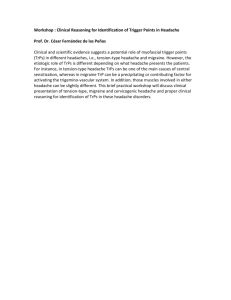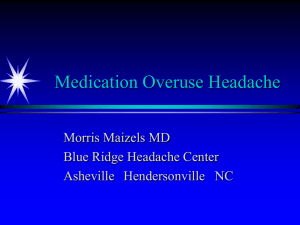Migraine Questionnaire: UK Study for Pharmacists
advertisement
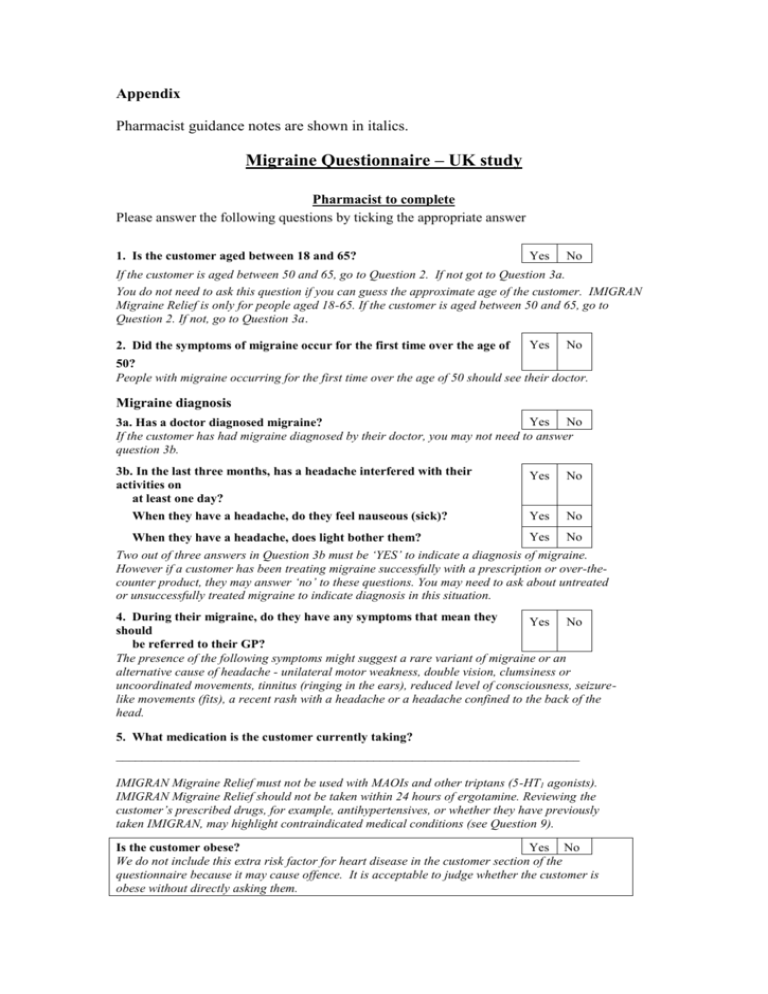
Appendix Pharmacist guidance notes are shown in italics. Migraine Questionnaire – UK study Pharmacist to complete Please answer the following questions by ticking the appropriate answer 1. Is the customer aged between 18 and 65? Yes No If the customer is aged between 50 and 65, go to Question 2. If not got to Question 3a. You do not need to ask this question if you can guess the approximate age of the customer. IMIGRAN Migraine Relief is only for people aged 18-65. If the customer is aged between 50 and 65, go to Question 2. If not, go to Question 3a. 2. Did the symptoms of migraine occur for the first time over the age of Yes No 50? People with migraine occurring for the first time over the age of 50 should see their doctor. Migraine diagnosis Yes No 3a. Has a doctor diagnosed migraine? If the customer has had migraine diagnosed by their doctor, you may not need to answer question 3b. 3b. In the last three months, has a headache interfered with their activities on at least one day? When they have a headache, do they feel nauseous (sick)? Yes No Yes No Yes No When they have a headache, does light bother them? Two out of three answers in Question 3b must be ‘YES’ to indicate a diagnosis of migraine. However if a customer has been treating migraine successfully with a prescription or over-thecounter product, they may answer ‘no’ to these questions. You may need to ask about untreated or unsuccessfully treated migraine to indicate diagnosis in this situation. 4. During their migraine, do they have any symptoms that mean they Yes No should be referred to their GP? The presence of the following symptoms might suggest a rare variant of migraine or an alternative cause of headache - unilateral motor weakness, double vision, clumsiness or uncoordinated movements, tinnitus (ringing in the ears), reduced level of consciousness, seizurelike movements (fits), a recent rash with a headache or a headache confined to the back of the head. 5. What medication is the customer currently taking? ________________________________________________________________________ IMIGRAN Migraine Relief must not be used with MAOIs and other triptans (5-HT1 agonists). IMIGRAN Migraine Relief should not be taken within 24 hours of ergotamine. Reviewing the customer’s prescribed drugs, for example, antihypertensives, or whether they have previously taken IMIGRAN, may highlight contraindicated medical conditions (see Question 9). Yes No Is the customer obese? We do not include this extra risk factor for heart disease in the customer section of the questionnaire because it may cause offence. It is acceptable to judge whether the customer is obese without directly asking them. Customer to complete Please answer the following questions by ticking the appropriate answer. If you cannot answer any of the questions, please leave it blank and ask the pharmacist or the pharmacy staff for help. Section A. About your migraine Not suitable for IMIGRAN Migraine Relief if they answer “NO” to one or more questions in Section A. 6. In between your migraine attacks, does the headache go away? Yes No 7. On average, do you have three or fewer migraine attacks each month? Yes No 8. Over the last three months, has the pattern of your migraine attacks been generally similar? (Consider how long they last, how often you get them and how severe they are.) Yes No It is normal to have some differences between migraine attacks. You can discuss this with the customer. Section B. About you Not suitable for IMIGRAN Migraine Relief if they answer “YES” to one or more items in Question 9. 9. Do you have, or have you had, any of these medical conditions? Heart disease including heart attack, angina (chest pain following physical activity), or heart failure? Yes No Problems with your circulation? Yes No High blood pressure? (You should get this checked each year) Yes No Stroke or mini stroke (transient ischaemic attack, TIA)? Yes No Liver or kidney disease? Yes No Known allergy to Imigran (sumatriptan)? Yes No Epilepsy or are you prone to having fits? Women - are you pregnant, might you be pregnant or are you breastfeeding? Not suitable for IMIGRAN Migraine Relief if: - they answer YES to three or more items in Question 10 or - they answer YES to two items in Question 10 and are obese. Yes No Yes No NA 10. If you are a woman, are you post-menopausal? (have your natural periods stopped) Yes No NA If you are a man, are you aged over 40? Yes No NA Do you have high cholesterol? Yes No Unsure Did any parent, brother or sister develop heart disease (heart Yes No Unsure Do you regularly smoke more than 10 cigarettes per day? Yes No Are you diabetic? Yes No attack or angina) before the age of 60? Obesity, the additional risk factor for heart disease is on the pharmacist section of the questionnaire. Unsure Migraine Questionnaire – Australian study Confirming migraine diagnosis – to be completed by the pharmacist 1. Has your doctor given you any medicines for migraine? Yes No Ask for details. If the subject can give the name a migraine-specific treatment, this provides good evidence of a previous doctor diagnosis of migraine. You may not need to complete Question 2 to help confirm a migraine diagnosis. Treatments include 5HT1 agonists (Imigran®, Suvalan®, Naramig®, Zomig®); ergotamine (Cafergot®, Dihydergot®); prophylactic therapy (Sandomigran®); methysergide (Deseril®) etc. 2. To help make a migraine diagnosis, please answer the following: In the last three months, has a headache interfered with your activities on at least one day? When you have a headache, do you feel nauseated (sick)? When you have a headache, does light bother you? Yes No Yes Yes No No To help confirm a diagnosis of migraine, at least 2 out of 3 answers to this question must be ‘Yes’. However, if the subject has been treating migraine successfully with prescription or OTC products, they may answer ‘No’ to these questions, so you may need to frame the question in relation to untreated or unsuccessfully treated migraine. 3. Did the symptoms of migraine occur for the first time over the age of 50? Yes No If 'Yes', please check whether the subject has seen their doctor. If a doctor has not diagnosed migraine, a 'Yes' response means that the subject is not suitable for treatment (but please continue with the Migraine Questionnaire) and should see their doctor. If 'Yes' and a doctor has diagnosed migraine, please make a note of this in the Comments section of the CRF and continue with the Questionnaire: the subject is potentially suitable for treatment. 4. When you suffer from this type of headache, do you get any other symptoms apart from the Yes No nausea/sickness or sensitivity to light or sound? Other symptoms…………………………………………………………… Mark ‘Yes’ if the subject reports any atypical symptoms (see below). If ‘Yes’ refer the subject to a doctor as they will not be suitable for OTC sumatriptan if any of the following symptoms are reported – unilateral motor weakness, double vision, clumsiness or uncoordinated movements, tinnitus (ringing in the ears), reduced level of consciousness, seizure like movements (fits), a recent rash with a headache or headache confined to the back of the head. Any recent worsening or major change in symptoms should be referred to a doctor. Days per month 5i. On average, how many days of headache do you have per month? Subjects with headache occurring on 15 or more days per month should see their doctor. Attacks per month 5ii. On average, how many migraine attacks do you have each month? The subject who has 4 or more attacks per month should be referred to their doctor. It may be difficult to establish a pattern of migraine if the subject has only recently developed migraine (< 6months or < 5 attacks). 5iii. In between your migraine attacks, does the migraine go away? Yes No Migraine headache is episodic, so there should be recovery between attacks. Any neurological symptoms (listed in Q4) should be referred to a doctor. 5iv. On average, how long does your migraine headache last if you don’t take any medication, or if the medication doesn’t work? Hours Migraine headaches which last over 24 hours should be referred to a doctor If a headache lasts less than 4 hours without treatment, the subject is not suitable to receive OTC sumatriptan. Is the subject obese? Yes No We do not include this extra risk factor for heart disease in the subject’s section of the questionnaire because it may cause offence. It is acceptable to judge whether the subject is obese without directly asking them. Suitability Assessment - to be completed by the subject 6. What medicines are you currently taking? (Include prescription medicines from your doctor, including the contraceptive pill, as well as over-the-counter (OTC) medicines, complementary medicines or herbal remedies that you may have bought yourself.) ________________________________________________________________________________________ ________________________________________________________________________________________ Ergotamine, ergotamine derivatives and other triptans (5HT1 agonists) should not be used for the same migraine attack. Reviewing the subject’s medicines (e.g. antihypertensives) and previous or current experience with sumatriptan may highlight contraindicated medical conditions (Question 7). Sumatriptan must not be used if MAOIs have been taken in the last 2 weeks. Women using a combined oral contraceptive pill should consult their doctor if the onset of migraine is recent, or if there is a worsening of migraine attacks. 7. Are you aged under 18 or over 65? Do you have, or have you had, any of these medical conditions? Heart disease including heart attack, angina or heart failure? Liver or kidney disease? Stroke or mini stroke (transient ischaemic attack, TIA)? Epilepsy or are you prone to having fits? Peripheral vascular disease (problems with your circulation causing pain in your calves when walking)? High blood pressure? (You should get this checked each year.) Have you ever had an allergy or bad reaction to sumatriptan (Imigran®, Suvalan®)? Women - are you pregnant, might you be pregnant or are you breastfeeding? Yes No Yes Yes Yes Yes Yes No No No No No Yes Yes No No Unsure Yes No Not Applicable Yes No Yes No Not Applicable Not Applicable Unsure If any response to these questions is ‘Yes’ OTC sumatriptan may be contraindicated. 8. Women, are you post-menopausal? (Have your natural periods stopped?) Men, are you aged over 40? Yes No Do you have high cholesterol? Did any parent, brother or sister develop heart disease (heart attack or angina) before the age of 60? Yes No Yes No Do you regularly smoke more than 10 cigarettes per day? Yes No Are you diabetic? If 3 or more responses, including obesity, are ‘Yes’, OTC sumatriptan 50 mg is not suitable. Significant risk factors for cardiovascular disease should be assessed by a doctor. Obesity, the additional risk factor for heart disease, is on the pharmacist section of the questionnaire. Unsure Migraine Questionnaire – German study1 1. About you… Are you: i. Under 18 years of age? Yes No ii. Over 65 years of age? Yes No iii. If you are female, are you pregnant, do you think you might be pregnant, or are you breastfeeding? Yes No Not applicable Subjects who answer ‘yes’ to any of these questions are not suitable for naratriptan. 2. About your migraine… Yes 1. Has your Doctor ever told you that you suffer from migraine? If the subject says ‘yes’, you may not need to complete Question 2 to help confirm a migraine diagnosis. No Yes No 2. In the last three months, has a headache interfered with your activities on at least one day? Yes No When you have a headache, do you feel nauseous (sick)? Yes No When you have a headache, does light bother you? To help confirm a diagnosis of migraine 2 out of 3 answers to this question must be ‘Yes’. However, if a subject has been treating migraine successfully with prescription or OTC products, they may answer ‘No’ to these questions, so you may need to frame the question in relation to untreated or unsuccessfully treated migraine. 3i. On average, how many days of headache, including migraine, do you have per month? Subjects with headache occurring on 15 or more days per month should see their doctor. Days per month Attacks per month 3ii. On average, how many migraine attacks do you have each month? A subject who has 4 or more attacks per month should be referred to their doctor. However, they can still be given naratriptan for an acute attack, providing all other answers indicate suitability for naratriptan. It may be difficult to establish a pattern of migraine if the subject has only recently developed migraine. 3iii. In between your migraine attacks, do all the symptoms of your migraine go away? Migraine headache is episodic, so there should be recovery between attacks. Any neurological symptoms (see Q4) should be referred to a doctor.2 Yes No Hours 3iv. On average, how long does your migraine headache last if you don’t take any medicine, or if it doesn’t work? If a headache lasts less than 4 hours without treatment, the subject is not suitable to receive naratriptan. Migraine headaches which last over 24 hours should be referred to a doctor. 4. When you have a migraine headache, do you get any other symptoms apart from the nausea/sickness or sensitivity to light or sound? Other symptoms…………………………………………………………… Refer subject to a doctor as they will not be suitable for naratriptan if any of the following are reported: unilateral motor weakness, double vision, clumsiness or uncoordinated movements, tinnitus (ringing in the ears), reduced level of consciousness, seizure like movements (fits), a recent rash with a headache or headache confined to the back of the head. Yes No Do any of the subject’s symptoms require referral to a doctor? Yes No 5. Did the symptoms of migraine occur for the first time over the age of 50? People with migraine occurring for the first time over the age of 50 should see their doctor. If a doctor has subsequently confirmed a diagnosis of migraine please make a note of this in the Comments section of the CRF and continue with the Questionnaire: the subject may still be suitable for naratriptan. If symptoms occurred for the first time over the age of 50 and a doctor has not diagnosed migraine, the subject is not suitable for naratriptan. 3. About your medical history… 6. What medicines are you currently taking (prescription medicines from your doctor, including the contraceptive pill, as well as medicines or herbal remedies you may have bought yourself)? _____________________________________________________________________________________ ___________________________________________________________________________________ Ergotamine, derivatives and other triptans (5HT1 agonists) should not be used for the same migraine attack. Reviewing the medicines (e.g. antihypertensives) and previous or current experience with naratriptan may highlight contraindicated medical conditions. Women using a combined oral contraceptive pill should consult their doctor if the onset of migraine is recent, or if there is a worsening of migraine attacks. 7. Has your doctor told you that you have or have had any of the following? Heart disease including heart attack, angina (heart pain in the chest brought on by exercise or exertion) or heart failure. Stroke or mini stroke (transient ischaemic attack, TIA). Peripheral vascular disease (for example, poor blood flow to the legs with pain on walking). Liver or kidney disease. Hereditary galactose intolerance, lactose deficiency or glucose-galactose malabsorption. Do you have high blood pressure, or are you taking medication for high blood pressure? (You should get this checked each year.) Yes Yes No No Yes Yes No No Yes No Yes No Yes No Yes No Men, are you aged over 40? Yes No Did any parent, brother or sister develop heart disease (heart attack or angina) before the age of 60? Has your doctor told you that you have diabetes? Have you been told that you have high cholesterol? Do you regularly smoke more than 10 cigarettes per day? Yes Yes Yes Yes No No No No Is the subject obese? Yes No Have you ever had an allergy or bad reaction to naratriptan? If any response to these questions is ‘Yes’ naratriptan may be contraindicated. 8. Do any of the following risk factors apply to you? Women, have you reached the menopause? Unsure Not applicable Not applicable Unsure Unsure Obesity is an important cardiovascular risk factor. A visual assessment to identify those who are clearly obese (BMI > 30 kg/m2) is acceptable. If a subject has three or more risk factors, naratriptan is not suitable. Significant risk factors for cardiovascular disease should be assessed by a doctor. ________________________________________ 1 The MQ was translated into German for the study. During the pharmacist training sessions held prior to the start of the study, pharmacists were given clear instructions to consider subjects with a migraine headache duration in excess of 24 hours as potentially suitable for naratriptan. However, such cases were to be referred to a doctor. 2
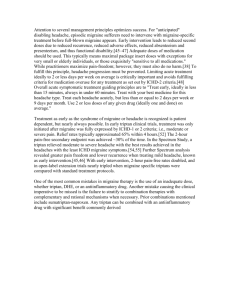
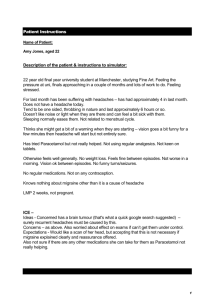

![[Plan Logo] [INSERT DATE] Dear Plan Member: Migraines can be](http://s3.studylib.net/store/data/007204786_1-1e3272ccd311201e3ba31cbff3397a69-300x300.png)
